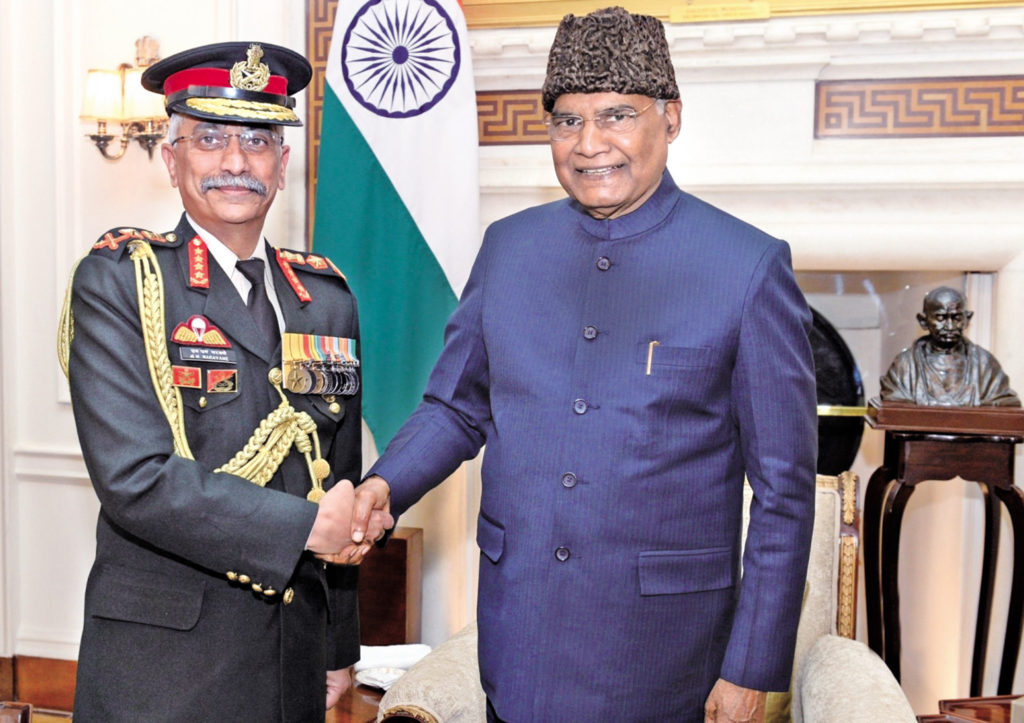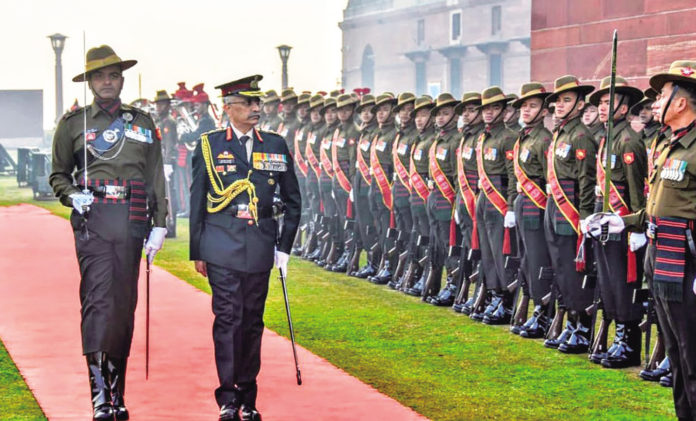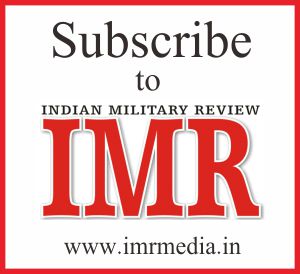The government, on 24 December, cleared the appointment of India’s first Chief of Defence Staff (CDS) who will be a four-star officer and head the Department of Military Affairs (DMA) in the defence ministry. The development came four months after prime minister Narendra Modi announced in his Independence Day speech the creation of the post for more effective coordination between the three armed forces.
The appointment of the CDS, perhaps the most significant reform in top military management in India, pending for almost two decades after the Kargil Review Committee (KRC) recommended it, is a major reform in India’s higher defence management.
The Cabinet Committee on Security (CCS) also approved the report of a high-level committee, headed by National Security Advisor (NSA) Ajit Doval, which finalised responsibilities and the enabling framework for the CDS. Union information and broadcasting minister Prakash Javadekar said during the Cabinet briefing, “He will be drawing a salary equivalent to service chiefs, and will head the Department of Military Affairs to be created under the Ministry of Defence. He will function as its Secretary,”.
The Union Cabinet also approved the charter and duties of the CDS. He will be a 4-star general who will have all the powers like other secretaries, including financial.
The CDS will be first among equals among Service chiefs. However, in the list of protocol, the CDS will be higher than the service chiefs.
Questions Over Seniority
The CDS that has emerged from does not command, is not even in-chargeof the three Services – the army, navy and air force, “so as to be able to provide impartial advice to the political leadership.”
Appointing the CDS to a “secretary” post is being seen as a creative bypass to the contentious question of the CDS’s precedence and seniority. The three Service chiefs are currently senior to the defence secretary. Designating the CDS a “secretary”, on par with the defence secretary, amounts to a downgrade.
Main Tasks
The CDS will act as a single-point military adviser to the prime minister and defence minister on key defence and strategic issues.
The new post is aimed at revamping the functioning of the armed forces, including removal of “obsolete practices”, augmenting combat capabilities and rationalisation of facilities.
The main task of the CDS will be to ensure ‘jointmanship’ among the three Services. This will include powers to work on setting up few theatre commands as well as allocating military assets among the services to synergise their operations. At present, the three services coordinate their work under the framework of the Integrated Defence Staff (IDS), which will be subsumed into the new structure after appointment of the CDS.
Mandate for the CDS includes creation of theatre commands, which will be tri-services joint commands. The CDS has been given a tight three-year schedule to show results in creating jointness among the three Services in operations, training, logistics, maintenance, repair, communications and support services. At present, the three Services have their own separate streams for all such matters, thus increasing the cost of procurement and day-to-day expenses.
The government has tasked the CDS to ensure optimal utilisation of infrastructure. Evaluation of “out of area” plans, enhancing use of indigenous equipment and prioritising weapon and equipment procurement of each service as per available budget, will be done by the CDS.
The most crucial function of CDS will be to assign inter-services prioritisation to capital acquisition proposals of Army, Navy and Air Force based on the anticipated budget and will work to reduce wasteful expenditure. CDS will enable the armed forces to implement co-ordinateddefence doctrines and procedures and to foster cohesion among the three services.
The CDS will also be the permanent Chairman of Chiefs of Staff Committee, which has the three Service chiefs as its members. Until now, the chairmanship of the CoSC was held in rotation by the senior-most service chief for short periods and the arrangement was found to be unsatisfactory.
Andaman and Nicobar Command is the only tri-service theatre command of the Indian Armed Forces based at Port Blair. It is likely to continue to remain under the COSC. The tri-service agencies commands related to cyber and space will be under the CDS. In other tri-services units, the chief of the lead force will hold operational charge.
The CDS will act as the Principal Military Adviser to the Defence Minister on tri-services matters. The three Service chiefs will continue to advise the defence minister on matters exclusively concerning their respective forces.
The CDS will be barred from holding any government post after his retirement. And no private employment will be permitted for five years after demitting office.
CDS will implement five-year Defence Capital Acquisition Plan (DCAP), and two-year roll-on Annual Acquisition Plans (AAP), as a follow-up of the Integrated Capability Development Plan (ICDP). The CDS will be a member of the Defence Planning Committee chaired by the National Security Adviser (NSA).
Background
A high-level committee set up to examine the gaps in the country’s security system in the wake of the Kargil war in 1999 had called for appointment of a CDS as a single-point military adviser to the defence minister. A group of ministers (GoM) analysing required reforms in the national security system had also favoured appointing a CDS.
In 2012, the Naresh Chandra Task force had recommended creating the post of a permanent chairman of the COSC.
The appointment of a CDS was one of the most significant recommendations made by the K Subrahmanyam-led KRC that was constituted in the immediate aftermath of the 1999 KargilWar to examine lapses that allowed Pakistani soldiers to occupy strategic heights, the initial sluggish Indian response, and suggest measures to strengthen national security. The KRC report was tabled in Parliament in February 2000.
The KRC recommended the creation of a CDS as a means to provide single-point professional military advice to the political leadership and to also achieve synergy in the working of the three forces. The KRC was perhaps the most comprehensive look at the systemic failures that allowed the Pakistanis to occupy the strategic heights of Kargil.


A year later, in February 2001, a GoM, under then home minister LK Advani, submitted its report to then prime minister Atal Bihari Vajpayee. The GoM was set up in April 2000 to review the national security system against the backdrop of the KRC recommendations. It recommended that a CDS be appointed. But the Cabinet Committee on Security (CCS) decided that the appointment of a CDS be taken up later after holding talks with different political parties.
Successive governments failed to build political consensus on appointing a CDS for almost two decades. The complete overhaul of India’s intelligence set-up and the creation of a younger and fitter army were among the most significant changes made by the government on the basis of recommendations of the KRC.
Some steps have been taken to improve jointness among the three services during the last two decades such as the creation of the HQ of the Integrated Defence Staff (IDS) and the raising of India’s first tri-service command – the Andaman and Nicobar Command. Created 18 years ago, the IDS is a single-point organisation for jointmanship that integrates policy, doctrine, war-fighting and military purchases.
However, prime minister Narendra Modi, on 15 August 2019, announced the creation of the new post.
==
Gen Bipin Rawat,
PVSM, UYSM, AVSM, YSM, SM, VSM, ADC
Chief of Defence Staff
General Bipin Rawat assumed office of the Chief of Defence Staff (CDS) on 1 January 2020. As the CDS, General Rawat will be the Principal Military Advisor to the defence minister on all Tri-Services matters. He will also head Department of Military Affairs (DMA). The CDS will have a key role in ensuring optimum utilisation of allocated budget, usher in more synergy in procurement, training & operations of the Services through joint planning and integration. The CDS will facilitate indigenisation of weapons and equipment to the maximum extent possible while formulating the overall defence acquisition plan for the three Services.
On taking over, General Rawat vowed to work to create more synergy among the three Services.
Former Chief of of the Army Staff General Bipin Rawat, is an alumnus of National Defence Academy, Defence Services Staff College, Higher Command and National Defence College. He also attended the Command and General Staff Course at Fort Leavenworth in the United States.
During his distinguished career in the Army, General Rawat commanded an Infantry battalion along the Line of Actual Control in the Eastern Sector, a Rashtriya Rifles Sector, an Infantry Division in the Kashmir Valley and a Corps in the North East. General Rawat had also commanded a Multinational Brigade in the Democratic Republic of Congo as part of a United Nations peacekeeping force. As an Army Commander, he commanded a theatre of operations along the Western Front and was appointed the Vice Chief of the Army Staff before assuming office of Chief of the Army Staff.
During the span of over 41 years in the Army, General Rawat has been awarded several gallantry and distinguished service awards.
==
What are CDS’s Powers and Responsibilities?
In rank and salary, Gen Bipin Rawat will remain the equal of the army, navy and air force chiefs, with the government having notified the CDS in “the rank of a four-star general with salary and perquisites equivalent to a service chief.” He is not the commander of all three Services – army, navy and air force. However, hewill also be the ex officio “Permanent Chairman, Chiefs of Staff Committee” (PC-COSC) – a body that includes all three service chiefs.
The government has specifically stated: “CDS will not exercise any military command, including over the three service chiefs.”
In rank, precedence and salary, Gen Rawat – like the three service chiefs – will be senior to the defence secretary, since service chiefs are the seniority equivalent of the cabinet secretary. Traditionally, the defence secretary, who heads the department of defence (DoD), enjoys greater importance than the MoD’s other four secretaries – who head the department of defence procurement (DDP), defence research and development (Defence R&D), ex-servicemen’s welfare (DESW) and defence finance (DDF). In the Allocation of Business Rules, the defence secretary is responsible for the “defence of India”.
Though the defence secretary has shed many of his responsibilities to the DMA, he retains responsibility for the defence of India and for making “defence policy”. He also remains responsible for all capital procurements from the defence budget. It is likely that, while the CDS will be nominally senior to the defence secretary, the latter will remain more influential.
As CDS, Gen Rawat can improve tri-service coordination and economise by eliminating duplication of military resources and facilities. He can also improve the military’s operational readiness by prioritising procurement of more urgently needed equipment. However, he can only list and prioritise requirements; the capital budget will be handled by the defence secretary.
The government has formally given the CDS the task of “restructuring of military commands for optimal utilisation of resources by bringing about jointness in operations, including through establishment of joint/theatre commands.”This would greatly improve the operational posture of the three services and create a culture of integrated tri-service operations. However, there is deep institutional resistance to creating theatre commands, especially from the air force.
The CDS will not be a single point military advisor to the government. The CDS notification states he “will act as the principal military adviser to Raksha Mantri (RM) on all tri-services matters. The three chiefs will continue to advise RM on matters exclusively concerning their respective services.” This is against Services ethos. It defangs the CDS’s opinion.
As head of the new “Department of Military Affairs” (DMA) in the MoD, the CDS will oversee substantive matters relating to the three Services, including promotions, postings and foreign assignments. This will translate into enormous power.



















